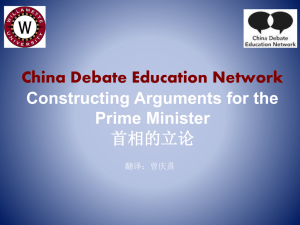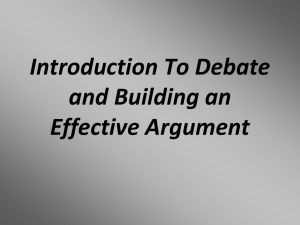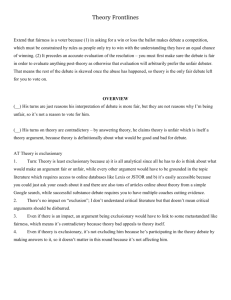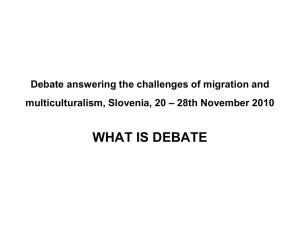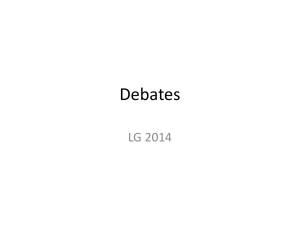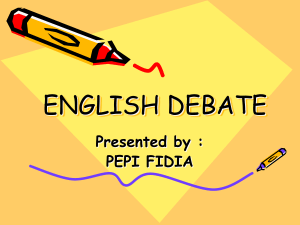T * No Risk Issues Bad
advertisement
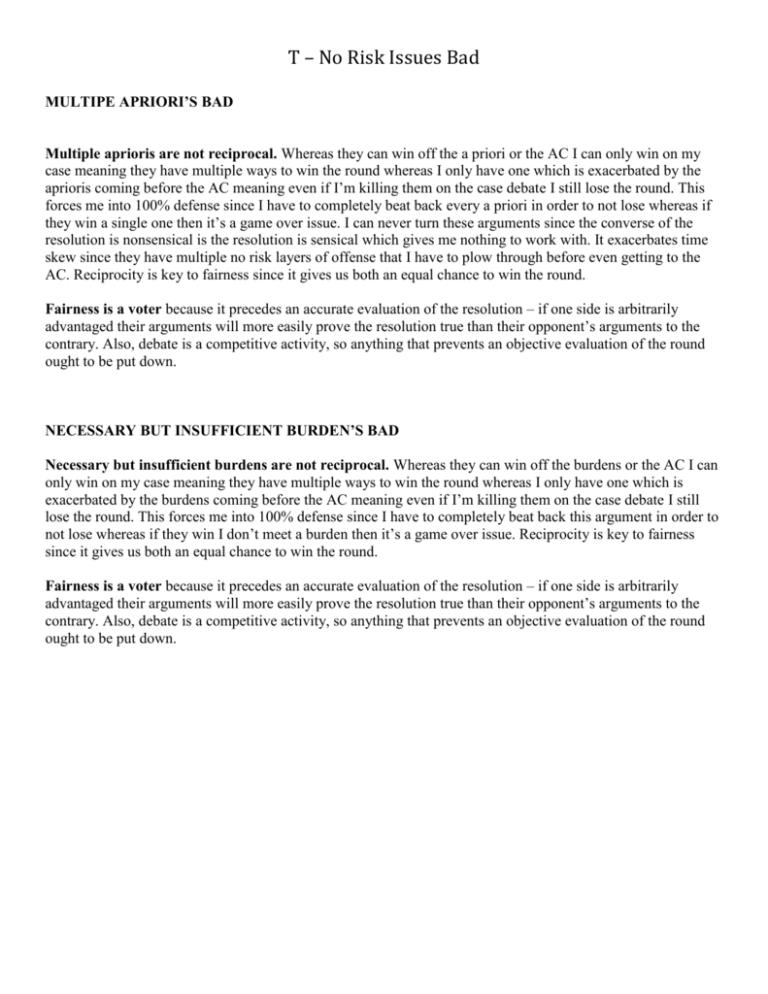
T – No Risk Issues Bad MULTIPE APRIORI’S BAD Multiple aprioris are not reciprocal. Whereas they can win off the a priori or the AC I can only win on my case meaning they have multiple ways to win the round whereas I only have one which is exacerbated by the aprioris coming before the AC meaning even if I’m killing them on the case debate I still lose the round. This forces me into 100% defense since I have to completely beat back every a priori in order to not lose whereas if they win a single one then it’s a game over issue. I can never turn these arguments since the converse of the resolution is nonsensical is the resolution is sensical which gives me nothing to work with. It exacerbates time skew since they have multiple no risk layers of offense that I have to plow through before even getting to the AC. Reciprocity is key to fairness since it gives us both an equal chance to win the round. Fairness is a voter because it precedes an accurate evaluation of the resolution – if one side is arbitrarily advantaged their arguments will more easily prove the resolution true than their opponent’s arguments to the contrary. Also, debate is a competitive activity, so anything that prevents an objective evaluation of the round ought to be put down. NECESSARY BUT INSUFFICIENT BURDEN’S BAD Necessary but insufficient burdens are not reciprocal. Whereas they can win off the burdens or the AC I can only win on my case meaning they have multiple ways to win the round whereas I only have one which is exacerbated by the burdens coming before the AC meaning even if I’m killing them on the case debate I still lose the round. This forces me into 100% defense since I have to completely beat back this argument in order to not lose whereas if they win I don’t meet a burden then it’s a game over issue. Reciprocity is key to fairness since it gives us both an equal chance to win the round. Fairness is a voter because it precedes an accurate evaluation of the resolution – if one side is arbitrarily advantaged their arguments will more easily prove the resolution true than their opponent’s arguments to the contrary. Also, debate is a competitive activity, so anything that prevents an objective evaluation of the round ought to be put down. T – No Risk Issues Bad FRONTLINES AT: You can run necessary but insufficient burdens too! 1. Negation theory dictates that the neg can win if the aff fails to meet a condition on the resolution being true even if that condition itself doesn’t make the resolution false. This isn’t the same for affs since if I undermine an assumption of negating that doesn’t give me offense. 2. This is retroactive - the burden was made in the NC meaning it wouldn’t be reciprocal until the 1AR – but it’s not legitimate for affs to generate new offense in the 1AR meaning I couldn’t have anticipated I needed to run burdens in the AC. 3. This puts me in a double bind - if I had no risk issues in my AC they would run theory against me, but the fact that I didn't have any of those means they can use the strategy of using them then employing this response to get out of theory - so either way I can never run them. 4. Me running these burdens would contradict the theory reasons why they’re bad i.e. forcing a debater to engage in a nonreciprocal strategy of 100% defense. AT: I’m kicking the argument so there’s no abuse. 1. He concedes the warrants in my fairness voter that unfair arguments arbitrarily advantage one debater which prevents an accurate evaluation of the round. Once an abusive practice is enacted the round will always be skewed towards one debater meaning at that point you can’t evaluate anything post-theory. Since theory is the only fair debate left for you to vote on – you pull the trigger on it since the abuse already happened in the NC. 2. Kicking the argument only proves the abuse – if I never ran theory then they’d definitely be going for the burden since I undercovered it because of the time skewed by their no risk spread and me having to run theory. If they didn’t recognize their argument was abusive then they’d just make the “no abuse” response, then take the most strategic option of winning a preclusive argument with little ink on it. Even so, saying the fact the argument is kicked means there’s no abuse means that it could have been extended to abuse me, and since they would have extended the argument had I not run theory, voting on theory is key to checking back the abusive practice. 3. Potential abuse is a voter since otherwise the neg can spew abusive arguments then kick them to gain the positive time tradeoff on theory meaning my only check on abuse is skewed against me since it’s being manipulated by their abusive strategies in order to disadvantage me even more. Since this time tradeoff is not reciprocal, it still links to my fairness voter. AT: Drop the argument, not the debater 1. You can’t just cross arguments out of the round since you can never separate an argument from your mind. Crossed out arguments have already interacted with other arguments in the round and created an impression on you as a judge and discredited other arguments. Even if we cross them out they’ve already had implications on the round. For instance, if I make a racist joke, even if we cross that joke out of the round, I’m still perceived as a racist for the entire round, and that affects how you as a judge views the debate. 2. He concedes the warrants in my fairness voter that unfair arguments arbitrarily advantage one debater which prevents an accurate evaluation of the round. Once an abusive practice is enacted the round will always be skewed towards one debater meaning at that point you can’t evaluate anything post-theory. Since theory is the only fair debate left for you to vote on – you pull the trigger on it since the abuse already happened in the NC. T – No Risk Issues Bad 1. the brightline - reciprocity is the brightline bc the foundation of any fairness claim is that both debaters have an equal opportunity to win so when that reciprocal divide is altered then the debate is unfair. The multiple AP’s bad interp is the most reciprocal and fair interp ever – you both have standards and you impact to them. Case vs. case. Also, there is no brightline to anything. For example, if we have a color scale of red and yellow theres no way to know when it goes from red to yellow, for instance orange. Also, if the abuse is clear they’ve obviously crossed the line. a) qualitative – can’t turn a prioris, precede the ac b) quantitative – they have multiple a prioris and you have one ac c) inevitable – 2. self-defeating - omg you can go for ground and kick education! a) only check – there is not an alternate form of recourse. There is not another way to check back cheaters. Theory is my only check on abuse. b) their fault – they forced me to run theory and started the debate with multiple AP’s so I had to run it. Also, they know I have this shell so they were asking for it by running multiple AP’s. c) gateway issue – since theory is a gateway issue, we have to first determine how we frame the round. Theory is a necessary tool to frame how the substantive debate should happen. d) contradiction – theory bad positions are theory oriented 3. education a) moving target – you don’t know which one they will go for. b) no clash – you’re spreading out the debate to all these blips and then in the next speech you choose the ones they put the least ink on – so there’s no clash. They’re going to go for what you drop which kills clash which is key to education because it shows us how to engage arguments. c) no uniqueness – education is nonunique since all of the same arguments could be made without being framed as a prioris. It’s also nonunique since you can get education out of round. The fact that they wrote the arguments means they already got all the educational benefits off them. 4. 1ar theory bad a) his fault - I’d have to preempt every single argument he’d go for. It’s his fault, if he wasn’t abusive, I wouldn’t have had to run 1AR theory. I can’t run theory until the abuse happens, so if the abuse happens in the NC, I can make the abuse story in the 1AR. The unfairness is a result of his practice. b) judges check – judges who flow can tell when an argument is being responded to in the 2ar as opposed to when there’s a new argument. The judge can compare the NR and the 2ar arguments. c) pre-empts check – the arguments won’t be new in the 2AR, they’re all preempts in the position. Also, it’s not my fault I get the last speech because I’m affirming. T – No Risk Issues Bad Pre-empts A. The brightline debate The brightline for fairness is reciprocal burdens - I get one way to affirm and he gets one way to negate. This functions on both a qualitative and a quantitative level, which means he should get the same amount of arguments and they should function on the same level. Since one of those conditions is violated, it is unfair. Also, exact bright lines are unnecessary. If I handed you a color gradient you couldn’t tell me exactly where it changes from yellow to orange, but that doesn’t mean they are not distinct colors. Further, a clear bright line is unnecessary in this instance because the in round abuse is so bad that we know he has crossed the brightline even if we don’t know exactly where that is. B. Theory is not self-defeating Don’t vote on arguments that reject theory because they eliminate any way to check back abusive strategies, which is a necessary pre-requisite to debate. Moreover, his abusive strategy forced me to run theory, meaning I am not being abusive, i.e. jailing a murderer isn’t an unfair limitation of rights because he deserves that punishment. Also, theory is a gateway issue, so it ought not be evaluated in the same way that substantive issues are because it frames those issues instead of acting as one. Also, I am not being unfair because I am only going for theory, which a) demonstrates the magnitude of the abuse and b) denies his claim that I can go for the resolution and theory. Lastly, there is no alternative this is the only strategy to check the abuse, as demonstrated by the fact that he has been abusive. Finally, “theory bad” is a theory argument itself because it creates standards for how debate should function. T – No Risk Issues Bad C. The education debate His strat creates a moving target because he can pick and choose what his real advocacy is as the round progresses. This destroys in round strategy because I have no way to predict what his advocacy in the NR is going to be, preventing effective comparison of arguments and skewing my ability to respond. This destroys education because I lose the ability to have comparative debate. Also, his advocacy is designed to prevent clash by going for the apriori I undercover the most, which destroys clash, which is the premise of educational debate. Also, there is no uniqueness to his education claims because we could have the same breadth of discussion without all his arguments being a priori. Fairness comes before education because education is a desired outcome of a fair debate, while fairness is necessary to make the debate adjudicable in the first place. Also, people won’t play an unfair game because without a fair chance of winning there’s no point – unlike Vegas, debate has no jackpots to offset the house advantage, meaning fairness is a prerequisite to educational debates. Finally, education comes from out of round prep and strategizing not the debate itself. D. He doesn’t get a 3NR Its his fault because he was abusive in the NC thus I have to run the argument in the 1AR. If I can’t make new answers in the 1AR I can’t even be responsive. Moreover, your bull shit meter checks this back you can tell when I’m going beyond simply answering his claims in the 2AR. Also, the fact that I am making all these pre-empts now checks that abuse cause he can answer them in the NR and I don’t have to go new in the 2AR. E. No abuse Denying his arguments were apriori is bad ground because I would have to win 100% defense on every argument because they are all sufficient to negate with even risk they are true. This creates a massive time and strategy skew. Also, this logic is infinitely regressive because it suggests you could always just answer abusive strategies justifying more and more abuse. Finally, this suggests that his links to the resolution are wrong, which is not always the case. His arguments are usually bad but the reason the argument comes first is generic and well justified.

